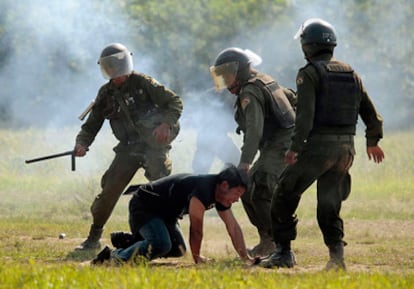Morales performs highway U-turn
Bolivian leader tries to pacify protesting Indians after violent police crackdown
Bolivian President Evo Morales has canceled plans to construct a controversial road through a nature reserve following a violent police crackdown on a large group of protesting Amazon Indians. The incident has tarnished his image as a defender of indigenous rights.
"There needs to be a national debate so the two provinces [Cochabamba and Beni] benefiting or involved in this can decide," Morales said late on Monday. "In the meantime, the project is suspended."
On Sunday police forcibly broke up a march held by about 1,500 local indigenous people, who are against the building of a highway that would split a national park in two. The officers used tear gas and batons to attack a tent-based camp of Indians near the village of Yucumo, more than 300 kilometers from the capital La Paz. Several protestors and officers were injured, officials said.
Deputy police commander Óscar Muñoz said they had moved in because they were threatened by natives armed with arrows. The police crackdown led to the resignation on Monday of Defense Minister Cecilia Chacón, who did not agree with the way government had handled the protest.
"I take this decision because I do not understand the intervention by the government and I can neither defend nor justify it," Chacón said in her letter of resignation to Morales. Chacón says that there were alternatives "within the framework of dialogue, respect for human rights, non-violence, and in the defense of Mother Earth."
Denying the version given by police, the country's ombudsman, Rolando Villena, said he had information that the agents acted at the very moment that the Indians were sitting down for dinner.
Speaking from New York, Morales demanded the "immediate cessation of violence" against demonstrators. He returned to Bolivia on Monday. Sunday's march was the breaking point of 41 days of protests.
On Saturday, there were moments of tension when a group of women detained Foreign Minister David Choquehuanca for more than an hour, an action that some in the government called "a kidnapping," although the minister, himself an Aymara Indian as is Morales, avoided using that particular word. The protest leaders have announced they are willing to resume their march when tensions have eased, and plan to pass through the village of Yucumo. Their access had been blocked over the weekend by hundreds of police, peasants and coca growers loyal to the president.
The Indians are protesting that the construction of the highway would lead to a reduction in Indian territory - the Isiboro Sécure National Park (Tipnis) - because they fear that the ecological reserve will be invaded by the coca producers. The $420-million road was to have been financed by the Brazilian government.
The police forced hundreds of Indians to board buses that took them to the nearby town of San Borja, from where they were returned to their communities, said Muñoz. The police chief added that he "arrested three or four people" and that several on both sides were injured, though not seriously.
All those detained were released on Monday.
Bolivian media reported that many Indian women were separated from their children and were asking for help to find them before they got lost in the forest. Police prevented journalists and photographers from covering the crackdown, and some lost their equipment during Sunday's fracas, according to Bolivian media reports.

Tu suscripción se está usando en otro dispositivo
¿Quieres añadir otro usuario a tu suscripción?
Si continúas leyendo en este dispositivo, no se podrá leer en el otro.
FlechaTu suscripción se está usando en otro dispositivo y solo puedes acceder a EL PAÍS desde un dispositivo a la vez.
Si quieres compartir tu cuenta, cambia tu suscripción a la modalidad Premium, así podrás añadir otro usuario. Cada uno accederá con su propia cuenta de email, lo que os permitirá personalizar vuestra experiencia en EL PAÍS.
¿Tienes una suscripción de empresa? Accede aquí para contratar más cuentas.
En el caso de no saber quién está usando tu cuenta, te recomendamos cambiar tu contraseña aquí.
Si decides continuar compartiendo tu cuenta, este mensaje se mostrará en tu dispositivo y en el de la otra persona que está usando tu cuenta de forma indefinida, afectando a tu experiencia de lectura. Puedes consultar aquí los términos y condiciones de la suscripción digital.








































